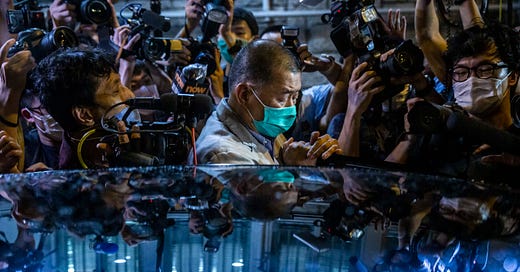Hong Kong on the Brink
Hong Kong gave Jimmy Lai everything. The Chinese Communist Party wants to take it away.

On May 14, Hong Kong police notified Apple Daily founder Jimmy Lai that his shares in Apple’s parent company, Next Digital, and other assets had been frozen under the national security law Beijing imposed in June 2020. Carrie Lam, China’s figurehead leader in the city, claimed on Tuesday the asset freeze would “reinforce” Hong Kong’s reputation as an international financial center. Couching it in terms of national security could not disguise the extraordinary, non-judicial nature of an order entirely lacking in due process.
The news reached Lai in jail where he is serving a sentence of more than one year for peaceful protests in 2019. He also faces, but has not been found guilty of, three national security prosecutions, one for subversion and two for “foreign collusion,” the latter carrying a possible life sentence. Aside from the impact on Lai and Apple Daily, the government’s move is an unmistakable signal to the business community to fall in line lest they too run afoul of the Chinese Communist Party.
The Lai assets freeze, and the Hong Kong government’s ham-handed rationalization, prompt a question: Will CCP leaders continue leading Hong Kong in a nosedive, or pull up before destroying the rule of law and freedom of information that have made Hong Kong a uniquely successful international financial center? The answer to that depends on whether the leaders of the United States and other democracies will impose consequences on China for pressing its antidemocratic agenda not only in Hong Kong, but around the world.
Lai, who is in his early seventies, believes in political and economic freedom, particularly the importance of property rights that ensure the individual’s independence from the state. As a young man, he worked in New York’s Garment District, where a friend introduced him to the work of Friedrich Hayek. Returning to Hong Kong, he launched a retail clothing chain. Lai was inspired by the June 4, 1989 massacre of democracy protesters in Chinese mainland cities to join Hong Kong’s democracy and human rights movement. Convinced of the importance of information to a free economy, Lai founded Next Magazine and Apple Daily. Their pro-democracy editorial policy made them very popular. When Lai was arrested in August 2020, people stood in line to buy Apple Daily and bought the paper's stock, earning the enmity of the CCP. The press and the free flow of information to which Lai has devoted himself are anathema to the CCP. As Beijing’s grip on the city has grown tighter, Hong Kong’s ranking in press indexes has plummeted. It was clear he was in the authorities’ cross hairs. He could have left Hong Kong, but he chose to stay and fight. “This place gave me everything,” Lai has said.
In another signal to businesspeople of the fate that might be theirs—Lai is also being prosecuted on a fraud charge related to a sublet of office space. In a report analyzing the national security law, the Georgetown University Law Center’s Lydia Wong and Thomas E. Kellogg noted that lease violations “could be handled administratively, and … the criminal charges seemed heavy-handed, at best.” The message to businesspeople in Hong Kong is clear: routine commercial practices will be fodder for political persecution in the future unless you demonstrate sufficient deference to the Party.
Some top businesspeople, particularly bankers, don’t seem to mind. When the national security law was imposed on Hong Kong by Beijing, HSBC’s Asia-Pacific chief, Peter Wong, stepped forward to endorse it. Observers argued that he “had no choice.” Which is of course the point: Beijing can demand fealty from anyone who wishes to do business there. HSBC is increasing its dependence on China and transferring top bankers to Hong Kong. Another reason Wong was trapped is that he belongs to a major CCP united front organization.
Expatriate businesspeople are under intense pressure from China. Some, writes Jamal Anderlini of the Financial Times, suffer from a business variation on Stockholm Syndrome—identifying with Chinese Communist Party authorities and resenting criticism of Beijing by “politicians, media or human rights groups in their home countries for antagonizing their captors.” According to Anderlini, “it is no longer enough to stay quiet about human rights abuses, unfair business practices or political interference. If you want to make money in modern China you have to toe the Communist party’s line, engage in ostentatious displays of fealty and assist in its propaganda efforts globally.”
Businesspeople in Hong Kong do not call the shots for their banks and employers. Many of them wish to leave as a result of the national security law, according to a recent survey of the American Chamber of Commerce. It is their bosses on Wall Street and the City of London and other capitals that must set a different course if international business wishes to avoid being coopted in the end of Hong Kong’s unique status as a financial center. However, without leadership—and pressure—from the very world leaders who profess to want to turn back China’s ambitious assault on democracy, Hong Kong will continue to suffer.
Beijing shows no signs that it values the attributes that distinguish Hong Kong from mainland cities and which the CCP cannot replicate. Chinese communist leaders will never feel about Hong Kong the way Jimmy Lai does. Only political and economic consequences imposed directly on Beijing can stop China’s assault on Hong Kong and everything it represents.



